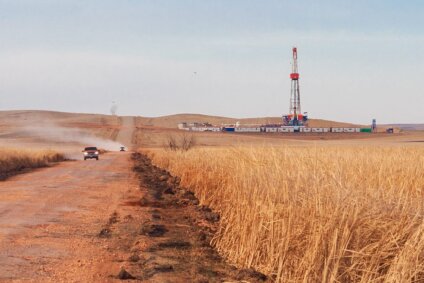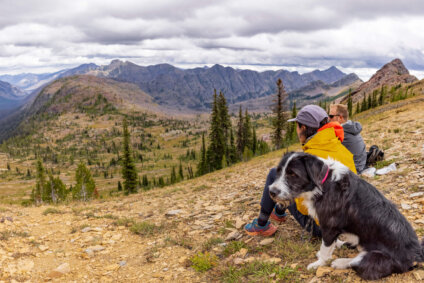Last Line of Defense Under Attack
Trump administration is going after bedrock law that protects public lands and keeps communities safe
Over the last three years, we’ve seen a prolonged, wide-ranging attempt by the current administration to cut the public, local communities, and science out of decisions that will determine how our public lands are managed for decades to come. The administration has dismissed millions of public comments, disregarded bedrock environmental laws, and ignored science and climate change so that special interests can turn a private profit out of exploiting public lands.
But there’s one law that serves as a last line of defense, keeping in check the impulse of this administration to dismiss the public and science from public land decision making, and that’s the National Environmental Policy Act (NEPA). Now the administration is trying to cripple this law as well.
NEPA is a commonsense law that protects people and communities from federal actions that could endanger the environment, wildlife, and the health of people and communities. It obliges the government to conduct environmental reviews of proposed projects before those projects get off the ground. It also obliges the government to accept public input on projects that could have a profound impact on the public lands in our backyard. NEPA applies to every agency across the government, including the Forest Service, the Bureau of Land Management, the Fish and Wildlife Service, and many others.
Overseeing the implementation of NEPA across all agencies is the White House Council on Environmental Quality (CEQ). It creates and enforces the regulations for implementing NEPA that the agencies must follow.
Last year, after losing several cases brought against it for not adhering to NEPA, the White House demanded that the CEQ “streamline” NEPA implementation.
The changes the CEQ proposed look more like a gutting of NEPA than a streamlining. To make matters worse, President Trump signed an executive order in early June to waive NEPA review entirely for many projects as a baloney response to the economic distress the country is facing as a result of Covid-19. It’s clear this administration has been looking for opportunities to sidestep NEPA, and it found an opportunity in the pandemic.
The proposed CEQ changes rob NEPA of its intent— to thoroughly understand environmental impacts of federal decisions—and instead turn NEPA into a paperwork exercise.
Here’s what the CEQ proposes to do.
Reduce opportunities for public input by:
- Blocking agencies from considering public comments submitted outside of official public comment periods.
- Allowing agencies to forfeit comments they deem lacking in substance or technical content. As a result, the commenters would no longer have legal standing to challenge the final decision.
- Applying standardized page limits and time limits on environmental impact statements and environmental assessments. This will restrict the agency’s interest and ability to hear from a full range of vested interests.
Minimize science in agency decision making by:
- Eliminating the requirement to analyze cumulative effects. For example, federal actions would not be required to analyze how their project will contribute to climate change or will exacerbate the effects of a separate project.
- Eliminating the requirement to analyze indirect effects. For example, downstream water pollution from a coal mine or drilling operation would not be assessed.
- Eliminating the requirement to prepare a full environmental impact statement for areas with archaeological resources, Wilderness, endangered species, parks, or other sensitive resources.
- Redefining what triggers NEPA in the first place and changing the definition of a major federal action. This would limit the scope of projects that require an environmental analysis based on how much federal money is involved, as opposed to how severe of an impact it will have on the environment.
Prioritize industry, corporations, and polluters at the expense of the environment by:
- Eliminating the requirement for NEPA contractors to disclose any conflicts of interest and even allowing companies to conduct their own environmental reviews. It would also allow companies to define the purpose and need of a project.
- Allowing agencies to determine, for themselves, that they have fully considered all of the information submitted by the public and to self-certify that consideration in a record of decision. This would create a “conclusive presumption” that is binding on the courts reviewing the agency action and would eliminate any opportunity for the judicial system to rule on whether public information was adequately evaluated.
Ultimately, these proposed changes put industry interests above our public lands and the health of the American people and turn NEPA into a rubber stamp for digging, drilling, polluting, and emitting on public lands without regard to wildlife, our outdoor recreation economy, our way of life, or the health of our communities.
An analysis of public comments submitted to the CEQ showed that 94% of the public is opposed to CEQ's proposed changes to the NEPA regulations. Americans overwhelmingly support maintaining a healthy environment, decision-making informed by sound science, and the right to comment on federal agency decisions. NEPA enshrines these values, but CEQ's proposed regulatory changes would all but eliminate this landmark environmental law.
The CEQ needs to come before Congress and the American people and explain why it’s decided to ignore public health, discount science, and remove climate impacts from how we make decisions about public lands.
Contact your representatives now and ask them to review and monitor the White House as it finalizes the new NEPA regulations. Congressional oversight is needed to ensure that our nation's premier environmental law continues to achieve the purposes for which it was intended.

Emily Cleveland
Senior Field Director
Emily works on developing collaborative land management efforts and building grassroots support and partnerships in the Gallatin and Madison Ranges, the Snowcrest Mountains, the Ruby Valley, the Crazies, and the Beaverheads. She enjoys skiing, hiking, biking, camping and exploring new places.
Email Emily
Stay Connected
"(Required)" indicates required fields


